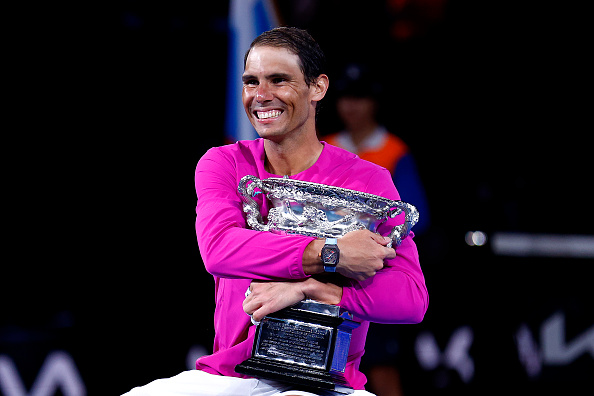Rafael Nadal: Back from the brink and out on his own after Australian Open win

Rafael Nadal has built a record-breaking tennis career on resilience and, at two sets down in the Australian Open final against a man 10 years his junior, the sport’s answer to the Duracell bunny proved that he still simply cannot be outlasted.
US Open champion Danniil Medvedev started the final as the favourite and was so convincing in the opening two sets that his fellow Russian and former men’s world No1 Yevgeny Kafelnikov tempted fate by declaring on Twitter: “It’s over”.
But Nadal dragged the match into a deciding set on the stroke of midnight in Melbourne and shortly after 1am the Spaniard sunk to his knees in celebration and relief at completing a truly epic 2-6, 6-7 (5-7), 6-4, 6-4, 7-5 victory.
It made the 35-year-old the first man to amass 21 Grand Slam titles, taking him clear of Roger Federer and Novak Djokovic, and left Medvedev flummoxed. “I asked him ‘are you tired?’, because that was insane,” he said.
Nadal called it “without doubt, one of the most emotional wins of my career”. He added: “If you put everything together, it has probably been the biggest comeback of my tennis career.
“Of course, it’s amazing to achieve another Grand Slam at this moment of my career. Of course, I know it’s a special number, 21.
“But I don’t care much if I am the best in history, one of the best in history, or not the best in history. Honestly, I don’t care much.”
Only two months ago, Nadal contemplated retirement as he battled a foot injury and was left bed-ridden by a bout of Covid-19. They were the just the latest episodes in a series of batterings his body has taken over the years.
He recovered sufficiently to play through pain at an Australian Open warm-up event in Melbourne, however. It was his first ATP Tour event for five months but he won.
Nadal carried that form into the main event and, wins over seeds Denis Shapovalov, Matteo Berrettini and now Medvedev later, he has become the second man to claim all four Grand Slams on multiple occasions – after Djokovic.
As for Djokovic, this was meant to be the tournament at which he won a 21st Slam. Instead the Serb, deported on the eve of the Australian Open, has had to watch as one of his great rivals has nudged the all-time record slightly further out of his reach.
Medvedev, who was just nine when Nadal reached his first French Open final in 2005, must wait to add to his solitary major title, which came at last year’s US Open.
This was his third defeat in a Slam final and a second against Nadal. Once again, he had the majority of the 12,000 spectators in Rod Laver Arena against him, and despite at times revelling in his villain role, he hinted at frustration afterwards.
“From now on I’m playing for myself, for my family, to provide for my family, for people that trust in me, of course for all the Russians because I feel a lot of support there,” he said.
As the Big Three era of Nadal, Federer and Djokovic winds down, however, Medvedev still looks the man most likely to win regular Grand Slams.
He beat other pretenders to that crown, such as Stefanos Tsitsipas and Felix Auger-Aliassime, on his way to the final, where he pushed one of the greatest all the way.
Medvedev will be back and, on the hard courts of the Australian and US Opens especially, will be one of the men to avoid.
Nadal, meanwhile, knows he only has so many more improbable comebacks in the tank. Fitness permitting, a 14th French Open title later this year looks a realistic prospect.
The King of Clay has only lost two matches at Roland Garros since 2009, both against Djokovic. Only a fool would bet against another meeting in Paris this springtime.
